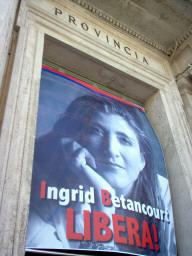Italian President Giorgio Napolitano on Thursday sent his ''sincere joy and keen congratulations'' to Colombian President Alvaro Uribe Velez following the release of French-Colombian politician Ingrid Betancourt and 14 others held hostage by a Marxist guerilla group.
Soldiers from the Colombian army rescued the hostages Wednesday by posing as members of a non-governmental organisation, duping members of the Revolutionary Armed Forces Of Colombia (FARC) to hand them over and then flying them to freedom by helicopter.
A dedicated anti-corruption and reform campaigner, Betancourt had been held captive since February 2002, shortly after she announced her intention to run for the presidency.
''All the Italians, who have followed the drama of the long ordeal with great intensity and sympathy, feel especially relieved to know that a woman who has become a symbol of freedom and courage for fighting peacefully for her beliefs has been returned to her loved ones and to her people,'' Napolitano said.
''The success of the operation confirms Colombia's strong determination to defend democracy against the threat of terrorism and organised crime - a commitment fully shared by Italy''.
The president also sent a message to Betancourt expressing his ''personal delight and relief'' as well as his ''admiration for her courage and her commitment to democracy'', adding that he hoped he would have the opportunity to meet her in Rome.
Foreign Minister Franco Frattini on Thursday called for Betancourt to be nominated for a Nobel Peace Prize, describing her as ''an excellent candidate'' as ''a living symbol of how peace, moderation and a message of reconciliation can be spread throughout the world''.
Adding that Italy had been ''strongly engaged'' with diplomatic and humanitarian efforts to secure the politician's freedom, he said he hoped her release would also be a turning point for ''national reconciliation'' and open a new phase of dialogue and democracy among all of Colombia's political groups.
Pope Benedict XVI was among the first of the world leaders to express his satisfaction following Betancourt's release late on Wednesday.
''It's wonderful news that brings great satisfaction and hope, both for Betancourt, who has suffered much, and for Colombia,'' said Vatican spokesman Federico Lombardi, adding that it was a ''sign of hope for many other people... in a country that has suffered greatly from violence''.
Lombardi said that the news was also ''a positive response'' to repeated appeals by the pontiff for Betancourt's release.
Pope Benedict met the politician's mother, Yolanda Pulecio, in February and told her he was praying for her daughter.
Premier Silvio Berlusconi described the release as ''a great joy''.
''A long and painful ordeal is over, something which Italy has always concretely fought for,'' Berlusconi said.
Democratic Party opposition leader Walter Veltroni, who regularly draped a large portrait of Betancourt over the city hall during his stint as Rome mayor in an effort to keep her plight in the public arena, said he was ''filled with enormous joy'' at her release.
Veltroni awarded Betancourt honorary citizenship of Rome in 2003, which was accepted on her behalf by her husband, Juan Carlos Lecompte.
Veltroni's successor as Rome mayor, Gianni Alemanno, said the politician's portrait would hang over city hall again on Thursday with the message ''finally free''. Betancourt spent much of her life in France before returning to her mother's native Colombia to enter politics in 1989.
In 1998, she set up the Oxigeno Verde party and in 2002, announced her intention to run as president, frustrated at her inability to effect change as a senator.









